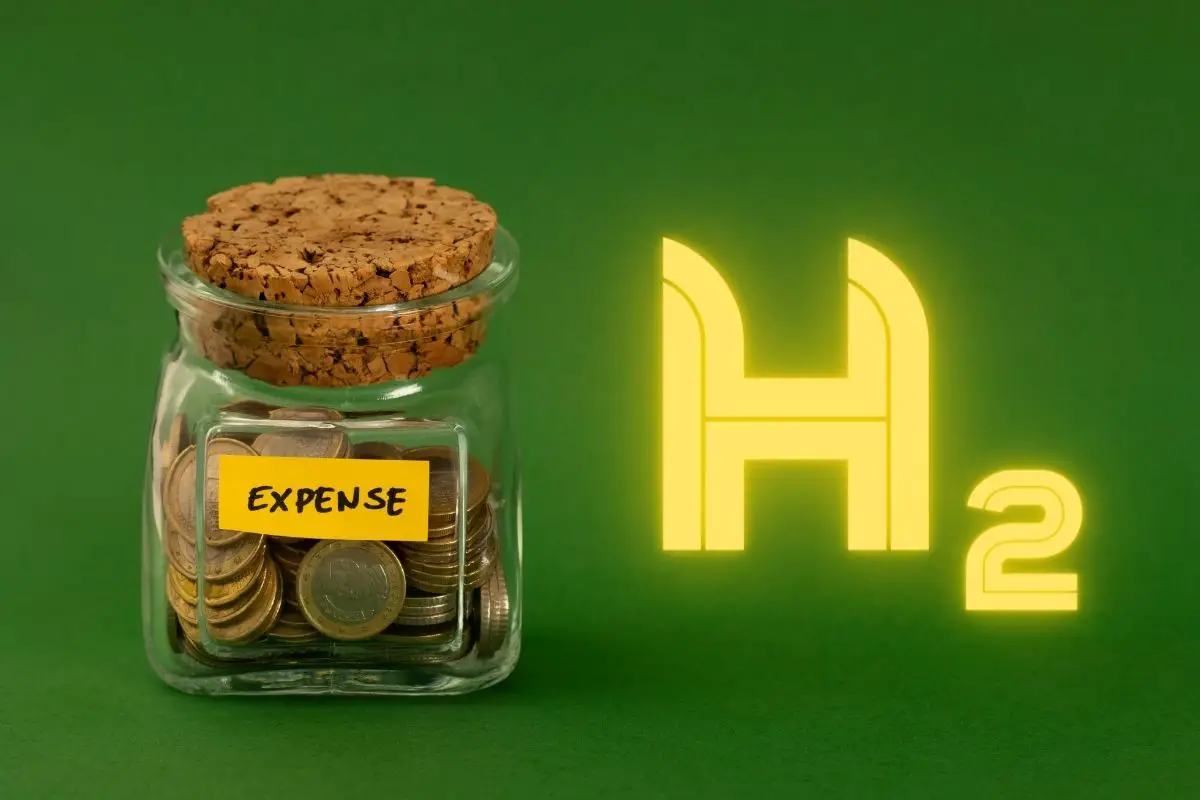
Are critics right about hydrogen fuel efficiency and production emissions?
January 20, 2022H2 is rapidly increasing in popularity, but not everyone is convinced it’s the key to decarbonization.
Hydrogen fuel has found itself at the center of many national, international and corporate decarbonization plans, but critics warn that it might not be nearly as useful for decarbonizing as it seems on the surface.
H2 is used greenhouse gas emission-free but its production and transportation can be another story.
Green hydrogen fuel, that is, the production method powered by renewable energy such as solar and wind, is produced without greenhouse gas emissions so that it can then also be used without producing any emissions. However, the green form of H2 is only a small fraction of current production methods and is not the main form outlined in most national decarbonization plans. Instead, blue H2 – produced using fossil fuels such as natural gas, followed by carbon capture and storage methods – are among those most commonly found in decarbonization plans.
Click to learn about the different types of H2.
This includes companies and governments around the world, including here in the United States. H2 is an important part of our infrastructure and decarbonization plan, though it doesn’t necessarily specify that renewable H2 will be preferred. Still, those plans move forward, discussing H2 as though all its forms are equally clean and beneficial to climate change strategies.
“In my travels around the world I can’t name a country that hasn’t expressed excitement about hydrogen,” said John Kerry, a US special presidential envoy for climate at last August’s Hydrogen Shot summit at the Department of Energy (DoE). “From Saudi Arabia to India to Germany to Japan we’re setting up hydrogen partnerships around the world to advance this critical technology that every country understands has the opportunity to play a vital role in the clean energy transition.”
Some critics say that updating and spreading awareness of the hydrogen fuel color system is critical.
The current H2 color system remains quite simplistic and requires an update that refines the definitions, said Hydrogen Council coalition executive director Daryl Wilson. Moreover, most people don’t even know that it exists and that not all hydrogen fuel is made in the same way.
“The color scheme is not helpful in in the sense that it’s not getting to the key point, which is what are the environmental attributes of the hydrogen being produced,” explained Wilson in a recent CNBC report. “The key issue is there has to be a methodology for tracking and declaring the specific CO² intensity of whatever hydrogen you’re working with.”
Supporters of hydrogen fuel use underscore its versatility but acknowledge the expense involved.
H2 already plays a central role in chemical industrial processes as well as in the steel industry. Therefore, producing it through those methods will play a central role in decarbonization, according to Independent Commodity Intelligence Services (ICIS) market research firm’s Jake Stones. Therefore, there are some methods of production that exist as a result of dirty processes already taking place. They may not be renewable energy, but they produce something clean, while completing a polluting process that would already occur.

That said, those clearly cannot be the only methods of production if the end purpose of using H2 is widespread rapid decarbonization.
Sunita Satyapal said about hydrogen fuel that “It’s often called the Swiss Army knife of energy.” Satyapal oversees H2 fuel cell technology for the DoE.
Clean forms of H2 have the potential to be used in decarbonizing industries that require substantial energy but where battery electric options don’t make sense with current technologies and capacities. For instance, heavy transportation such as shipping vessels, big rig trucking, and aviation have the potential to benefit from
Equally, due to issues of efficiency, infrastructure and the fact that battery electric vehicles are already increasingly widely available and recognizable, many feel that clean H2 doesn’t have as much potential in other areas such as passenger vehicles. Still, some Toyota news headlines continue to show that fuel cells and even hydrogen combustion engines have not been abandoned.



 With over 15 years of reporting hydrogen news, we are your premier source for the latest updates and insights in hydrogen and renewable energy.
With over 15 years of reporting hydrogen news, we are your premier source for the latest updates and insights in hydrogen and renewable energy.
Renewably derived True Blue H2, solely from oceans, is only hydrogen source that directly sequesters waters of sea level rise. Managed utilization is elegant and “meant to be”.
Companies and governments will fail to success in their goals. inevitably
The problem is not the hydrogen itself, but the model they want to use to produce, distribute and use it.
Is the same model that has being leading us into failing as a specie.
Capitals, Companies and governments has to let go that centralized control on the energy.
Hydrogen should be designed to be produced in every country, every business, every household and by every individual. Then there will not necessity of transportation and distribution.
Inferring the concept of “making hydrogen” when it is used to move renewable electric power is harmful. In conflates the enabling of post-carbon, intermittent power with the unrelated extraction, depletion and pollution abatement of hydrogen-containing matter from the earth. There is no connection except that which non-scientific pundits conjure up to sell articles to technology nescient publishers.
Indeed.
Totally agree with you!
Decentralization is the key.
And by the way, this company is providing electrolysers small enough yet scalable for a very decentralized hydrogen production (ideally using renewable electricity of course) at an affordable cost: enapter.com
Using sea water is only a temporary and tiny consumption of water that would soon return to the ocean after the hydrogen produced would react with oxygen and return to the ocean as water.
It’s dead simple:
GreenH2 is the only game in town to decarbonise sectors of energy use that cannot be decarbonised directly and cost-effectively by electricity and batteries:
Heavy transport; heating & hot water; synfuels & plastics manufacture; other industrial processes; etc..
NuScale Power recently announced they can supply 800C steam to high temperature steam electrolyser (HTSE) plant which bumps up hydrogen production by 50% over ‘cold’ electrolysis – from ~18 kg/MWh to ~27 kg/MWh(equivalent).
With every year that passes, further improvements in production rates will be made.
Hydrogen produced from Renewable Electricity has several problems. Electrolysis of water to produce hydrogen is more expensive than steam methanation of natural gas. The “central production” of hydrogen from Renewable Electricity requires transport from the “Renewable Farm” to the end user–transporting hydrogen over long distances is expensive and difficult. Why not use that Renewable Electricity as a way to decrease the electicity produced by coal fired power plants? Producing hydrogen from Renewable Natural Gas with carbon capture is cheaper and as “environmentally friendly” as electrolysis. The hydrogen can be produced “on site” using renewable natural gas and HyGEAR technology negating the need for long distance transport of hydrogen.
Global Power Reduction, Inc. has been evolving hydrogen gas from clean chemicals, without using electrolysis, since 2003. All we need is funding for a proper facility and the right equipment, and for salaries for the key personnel. 352-999-3524 (Ken Hudson)
What is the cost of the ‘clean chemicals’ you use for evolving hydrogen at Global Power Reduction, Inc., Ken, and what is the purity of the hydrogen (is it suitable for H2 fuel cels?)? Have you conducted a study of economics on the process and looked into how these ‘clean chemicals’ are produced and what their impact on the environment is/was?
Although true that each of the standard colors of hydrogen all produce a “0” emission fuel and the production of that H2 fuel had a negative impact on the environment because of the required production of wind turbines or solar cells. However, in the near future a new color of hydrogen will be introduced for H2 that was produced by splitting hydrogen sulfide, H2S, instead of hydrogen oxide, H2O. Also noteworthy is the fact that thermodynamics shows us that splitting H2O required six times as much energy as splitting H2S, a waste produced by many industries including petroleum refining.
No one ever mentions Hydrogen Power NH3. Is it too expensive to create?
Ammonia, NH3, may be a convenient way to transport the power of clean hydrogen, but the production of ammonia still requires hydrogen plus a fair amount of energy to bond the hydrogen to the nitrogen.
Niemand erwähnt was höchste Effekte für die Umwelt zeigt.
??
Energie einsparen!
Will TEchnology come up with a way to produce it at a lower cost ? Australia has wide open spaces to produce the Excess Solar , Wind ,Hydro energy required to make Hydrogen or Ammonia to transport for others to use but unless it is at a lower cost than others using their own Nuclear and other energy to make their own and the Developing countries stop using Coal ,its doubtful that it will happen. . Large Global corps will subsidise the production of cheap energy , if Australia can produce it at a lower price than extracting Natural Gas then Japan would likely use it , Chinese could invest in Australia providing the Solar panels to enable the energy production but we don’t trust them
ONLY dispersed production of Green Hydrogen makes sense. Not only does it offer all the savings on trucking the feedstock and on power transmission, but also offers local communities green, clean energy independence.
With the potential of waste biomass on dry land surpassing global electricity needs 10 times! (IRENA Report), local, dispersed production of H2 from biomass is definitely a route to pursue. The key is compact, mobile, and containerized solution which can accept a full range of biomass waste, and can be deployed anywhere there is waste biomass available… and that means countless locations around the world.
Such a solution is mPower200, based on a simplified, stable, thermal conversion process which eliminates the problem of gas cleaning, converting biomass to H2/CO syngas without the traditional, heavy and unstable gas-cleaning technology.
I have an idea.
Sea water is highly corrosive as can be seen in some of the early, abandoned, Desalination plants but we already solve this problem by using the right material to build new ones. In this same way we build plants to use sea water to feed electrolyser stacks to produce green hydrogen. This is then fed to a sister plant next door which converts the H2 to ammonia. This is then collected and stored ready for transfer to ships either for their own use or as a carrier to transport it where needed (some may be used in a small power plant to feed the plants and make them self sufficient, once running)
Simples …